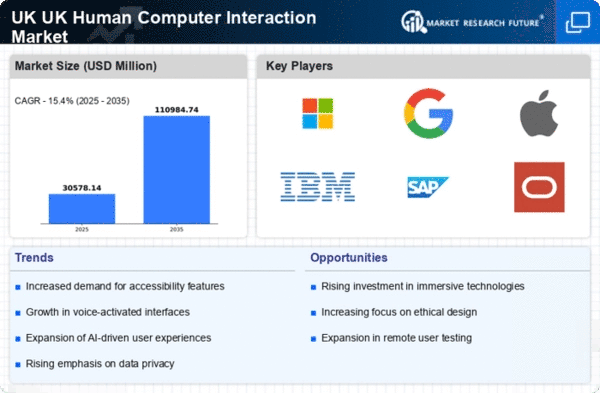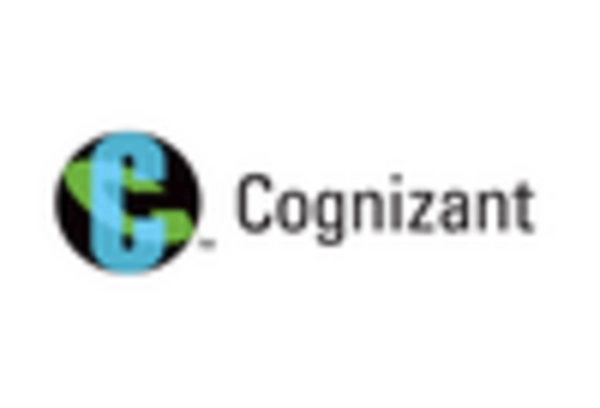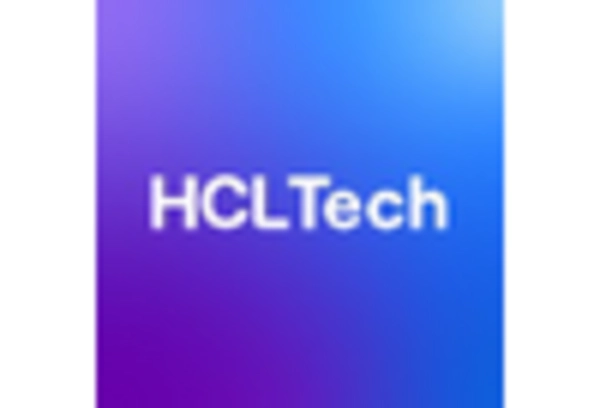Increased Investment in HCI Research
The UK Human Computer Interaction Hci Market is benefiting from increased investment in HCI research and development. Government initiatives and funding programs are encouraging academic institutions and private companies to explore innovative solutions that enhance user interaction with technology. The UK government has recognized the importance of HCI in driving economic growth and has allocated resources to support research projects that focus on user experience and interface design. This influx of funding is likely to lead to breakthroughs in HCI methodologies and technologies, fostering a more dynamic market landscape. As a result, the UK Human Computer Interaction Hci Market is expected to expand, with new products and services emerging that prioritize user engagement and satisfaction.
Growing Demand for Intuitive Interfaces
The UK Human Computer Interaction Hci Market is witnessing a growing demand for intuitive interfaces that enhance user experience. As technology evolves, users expect seamless interactions with devices and applications. This trend is driven by the increasing reliance on digital platforms across various sectors, including finance, healthcare, and education. According to recent data, the UK digital economy is projected to reach over 400 billion GBP by 2025, indicating a robust market for user-friendly designs. Companies are investing in research and development to create interfaces that cater to diverse user needs, thereby fostering engagement and satisfaction. This focus on intuitive design is likely to propel the growth of the UK Human Computer Interaction Hci Market, as businesses recognize the importance of user-centric solutions in maintaining competitive advantage.
Rise of Remote Work and Collaboration Tools
The UK Human Computer Interaction Hci Market is experiencing a rise in demand for remote work and collaboration tools. The shift towards remote working arrangements has necessitated the development of user-friendly interfaces that facilitate effective communication and collaboration among teams. Companies are increasingly investing in HCI solutions that enhance virtual interactions, ensuring that users can navigate platforms with ease. Market analysis indicates that the collaboration software market in the UK is projected to grow significantly, driven by the need for efficient remote work solutions. This trend is likely to influence the design and functionality of HCI products, as organizations seek to create environments that support productivity and user engagement in the evolving landscape of work.
Regulatory Support for Digital Accessibility
The UK Human Computer Interaction Hci Market is increasingly shaped by regulatory support for digital accessibility. The UK government has implemented policies aimed at ensuring that digital platforms are accessible to all users, including those with disabilities. The Accessibility Regulations under the Equality Act 2010 mandate that public sector websites and applications meet specific accessibility standards. This regulatory framework is driving organizations to prioritize inclusive design in their HCI strategies. As businesses adapt to these regulations, there is a growing market for HCI solutions that facilitate compliance while enhancing user experience. Consequently, the UK Human Computer Interaction Hci Market is likely to see a surge in demand for accessible technologies that cater to a diverse user base.
Advancements in Virtual and Augmented Reality
The UK Human Computer Interaction Hci Market is significantly influenced by advancements in virtual and augmented reality (VR and AR) technologies. These innovations are transforming how users interact with digital content, providing immersive experiences that were previously unattainable. The UK is home to a burgeoning VR and AR sector, with investments from both public and private entities aimed at enhancing user engagement in fields such as gaming, education, and training. Market data suggests that the VR market in the UK is expected to grow at a compound annual growth rate of over 30% in the coming years. This growth indicates a strong potential for HCI applications that leverage these technologies, thereby driving the evolution of user interfaces and interactions in the UK Human Computer Interaction Hci Market.






































































